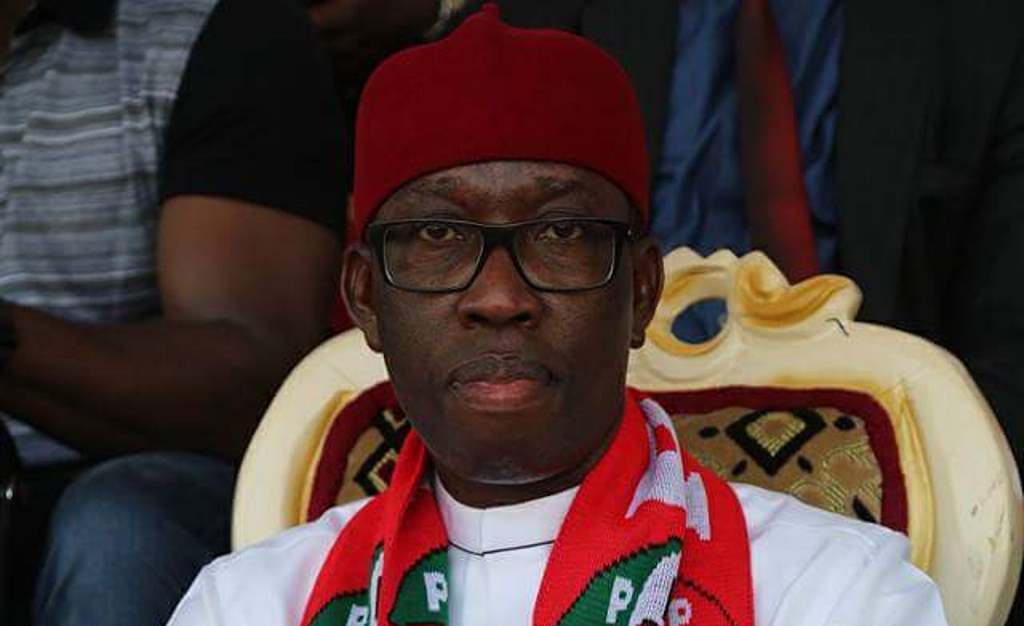At the first Nigeria-China Governors Business Forum (NCGBF) held in Guangzhou, China between April 13th and 14th 2017, Delta State Governor Ifeanyi Okowa presented four investment priorities for the State.
The four investment priorities presented by Governor Okowa at the business forum are hinged upon agro-industrial parks initiative, smart city development, airport development, and gas-based industrial park.
The Governor, who said the vision is to make the state a pacesetter in the Nigerian federation, said his administration will leverage on the comparative advantage of the state, promising prosperity for all Deltans based on his SMART, 5-point agenda.
The comparative advantage, of which, are: the State as a leading producer of oil and gas; the nonoperational 4 seaports, rich vegetation and fertile soil suitable for agriculture; strategic location of the State, and the young, educated and active population.
Based on the SMART agenda, Okowa promised strategic wealth creation and jobs for all Deltans; meaningful peacebuilding platforms aimed at political and social harmony; agricultural reforms and accelerated industrialization; relevant health and education policies, and transformed environment through urban renewal.
Three years into the Okowa’s administration, and approaching the election year 2019, it becomes sacrosanct to ask the imperative question: Has Governor Okowa achieved his investment priorities for Delta state?
The Governor also promised establishment of Delta Micro, Small and Medium Enterprises Development Agency and Job Creation Office. These have resulted in the offspring of programmes such as the YAGEP, STEP, PPSP, GEEP and the tractorization microcredit scheme.
So far, the State government has spent billions of Naira on these offshoot programmes. However, it is yet to be known whether the resultant SMEs are sustainable or they will go the way other empowerment programmes of past administrations have gone.
Governor Okowa also promised diversification of the State’s economy through cassava, rice, tomato, oil palm and aqua-culture agro-businesses. He said the development of road, energy, housing, and water infrastructures would be a priority, and that the State will rely heavily on private sector partnership hinged upon foreign direct investment (FDI) and local investors.
One of Okowa’s private sector partnership projects is the Asaba multi-million Naira mechanic village. So far Governor Okowa has spent billions on the Asaba multi-million Naira mechanic village.
At a quarterly media interaction held in Asaba on the 21st March 2018, Okowa said, to curtail the perennial flooding in the State’s Capital alone, the State will spend a whopping sum of N11 billion. He said his administration was committed to fulfilling his campaign promises, including ending the ordeal Asaba residents have to encounter during the rainy season due to flooding.
The governor disclosed that N720 million was spent in conducting the January 6 Local Government election in the state, including the runoff in some parts of the 25 council areas. He also said that government had set aside N2 billion for the Ministry of Basic and Primary Education to renovate and furnish over 1,600 public primary schools across the state.
He said the state government was supporting some local governments to build rural markets to grow commerce. The Governor added that it had completed the Oghara Market and approved the building of Ozoro and Burutu Markets.
On security, he said that government had inaugurated various peace-building committees which had ensured the sustainability of existing peace in the state. The state government also approved an undisclosed amount for the completion of the Stephen Keshi Stadium, Asaba. The Asaba International Airport project has gulped a total of N27.2 billion after 10 years of work on the project. The runway and taxiway alone cost N3 billion.
All these, others not captured here, the Governor has done with the view to realizing his investment priorities for Delta state. While most of the projects are concentrated in the Capital, a handful of others are scattered across the State.
Aside from empowerment through the YAGEP, STEP, PPSP, GEEP schemes and political appointments, the State has not provided key employment opportunities for Deltans under the Okowa administration; not even resurrect the scam recruitment exercise of former Governor Emmanuel Uduaghan. Even, EduMarshals lost their jobs.
ICT hubs; factories; ports; stable electricity; proper waste/environment management system; proper drainage system to avoid flooding and erosions across the State; clean pipe bore water, good schools, good hospitals, not photoshopped ones, etc; are still far from achieved in Delta state.
If Delta state must achieve the status of a smart city as captured in the Governor Okowa’s Delta state investment priorities paper, then he must push for robust telecoms infrastructure just as the way his counterpart in Edo state is doing. A state cannot be said to be smart when there is no broadband penetration.
It is worthy to note that no government in Delta state, not even the Okowa’s, has dared ventured into projects akin to what is obtainable in states like Lagos state, given comparative allocations the State has accrued in the past three years.
While Governor Okowa has done novel in certain areas, there are key areas his administration is yet to meet up so far, and only Deltans can actually judge if Governor Okowa has done novel.
So, we ask, has Gov. Okowa achieved Delta state investment priorities?
Leave your comment below.



